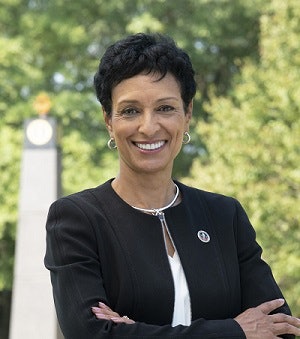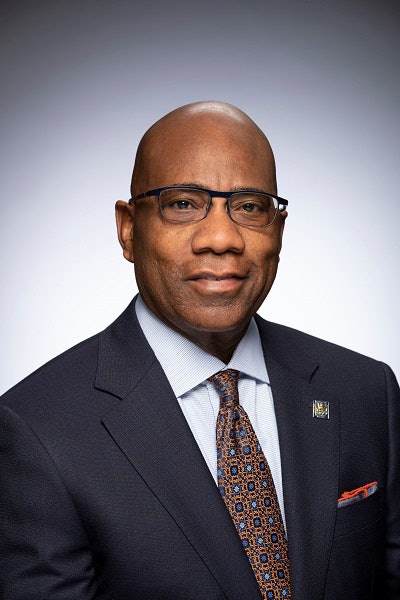By the time Dr. Aminta H. Breaux was named president of Bowie State University in July 2017, a contentious, federal lawsuit to remedy longstanding racial disparities and funding inequities at four historically Black colleges and universities (HBCUs) in Maryland was already in its 11th year.
 Bowie State University president Aminta H. Breaux. (Photo: Bowie State University)
Bowie State University president Aminta H. Breaux. (Photo: Bowie State University)Today, Breaux wonders if and when closure, for the case that began in 2006, will ever come.
“When I joined Bowie State University, I didn’t have high hopes that I would see closure during my time as president,” she said. What Breaux observed was how “far apart parties were” as they sought a settlement, and how efforts to secure a remedy “had slowed.” That was in 2018, when the court stayed all proceedings in the case.
Now, the long-awaited closure and settlement of the 13-year-old legal battle brought by a coalition of advocates and alumni from the HBCUs – Bowie State University, Morgan State University, Coppin State University and U of Maryland Eastern Shore – is in limbo.
Last month, Maryland’s Republican Gov. Larry Hogan vetoed a bill that would have delivered more than half a billion dollars in funding over 10 years to his state’s Black colleges and universities. Hogan cited the impact of the COVID-19 pandemic on the state for his decision.
“The economic fallout from this pandemic simply makes it impossible to fund any new programs, impose any new tax hikes, nor adopt any legislation having any significant fiscal impact, regardless of the merits of the legislation,” Hogan wrote in a veto letter.
The funds for the state’s HBCUs would have also ended the long-standing lawsuit in which U.S. District Judge Catherine Blake ruled that Maryland had maintained a dual and segregated education system and had underfunded HBCUs for decades.
“It’s no surprise that we are disappointed,” said Michael D. Jones, an attorney for The Coalition for Equity and Excellence in Maryland Higher Education. But he and others agree that the COVID-19 pandemic is no excuse for the legal setback.
 Michael D. Jones. (Photo: Kirkland & Ellis, LLP.)
Michael D. Jones. (Photo: Kirkland & Ellis, LLP.)Hogan’s veto “is not about the economic condition of the state of Maryland. States have always gone through economic cycles,” Jones told Diverse.
“In September, well before COVID-19, the governor made it clear that he was not going to pay more than $200 million to fix an academic disparity that he admitted would cost at least $1 billion, if not $2 billion. It is disingenuous to now claim that the state cannot afford to remedy this decades long racial disparity because of the recent pandemic. There isn’t a recession exception to a constitutional violation.”
The governor’s veto last month surprised Dr. David Kwabena Wilson, president of Morgan State University in Baltimore. He remembers the day in March when the legislative session ended with Maryland lawmakers voting overwhelmingly in favor of needed HBCU funding, something Wilson said was no small feat. In many ways, it signaled for Wilson and the other Black college leaders that an end to the litigation — and settlement — was finally near.
“We were hopeful that the governor would sign the bill, thus righting the wrongs of the past and setting institutions like Morgan on a course to be competitive with any flagship university across the nation,” Wilson told Diverse. But disappointment followed.
“Never would we have expected the governor to veto the bill given the state’s more recent support of Maryland HBCUs, particularly Morgan,” Wilson added. “We are disappointed by the decision and view it as a missed opportunity.”
With a settlement, each of the four HBCUs would receive a slice of the funding pie based on enrollment size. With nearly 5,500 undergraduates, Bowie State, Maryland’s oldest HBCU, could receive about $16.8 million.
On the campus known for its STEM programs, Breaux said that funding could help fuel new “workforce-related, academic programs and grow and enhance graduate programs.” One thing the lawsuit alleged was that state policies perpetuated segregated higher education by allowing predominantly White state colleges and universities to create new programs that duplicate those at historically Black institutions.
“For us to continue, especially as a public university, we need to meet the needs of the state’s workforce by developing programs that make them competitive” and prepared, said Breaux who serves on the President’s Board of Advisors on Historically Black Colleges and Universities. “We are looking forward to offering things like new certification programs and delivering academic programs in a different way. That will take being more agile and nimble, not just about what programs are delivered but how they delivered.”
But with the next steps for the HBCU litigation uncertain, following the veto, plans for those new academic programs remain stuck on Bowie State’s wish list.
“It’s disappointing,” she admitted. The legal wrangling, over the years “impacted our ability as HBCUs to fully compete in a very competitive higher education marketplace and do what we need to do for students. I’m sorry to see the legislation vetoed.”
Today, though, Breaux’s focus is on navigating her campus during a pandemic. Bowie remains closed and her students are online, an uncertain fall semester is nearing and a budget shortfall is projected — not unlike what all other HBCUs are facing. While funding relief from the CARES Act provided a needed boost, Breaux said there will still be “tough decisions to make in this new normal. We owe it to our students and campus to find a way forward.”
The governor’s veto, said Jones, does not signal the end of the legal journey for Maryland’s HBCUs and the funds they’ve been seeking from the state. “The legislature can and should override the veto” when Maryland’s Democrat-controlled legislature reconvenes in January 2021, he said. But if the case can’t be settled, Jones added, “it will be decided by the 4th Circuit Court where the appeal is now pending.”
Morgan State’s Wilson agreed. Legislative resolve for the case is Wilson’s preferred next step. But for now, he just wants “the door for reconsideration to remain open.”
 Dr. David K. Wilson
Dr. David K. WilsonAlvin O. Chambliss Jr., legendary for legal work over three decades in the higher education desegregation case Ayers v. Barbour (formerly Ayers v. Fordice), is not on the legal team for the Maryland HBCUs, but he’s watched with a critical eye from the sidelines. That means the recent veto wall the case hit in May hasn’t gone unnoticed.
According to Jones, Ayers, the historic Supreme Court case which sought to remedy inequalities rooted in past segregation of higher education in Mississippi provided the legal framework for the coalition’s legal battle.
But unlike Ayers, Maryland’s was not “a comprehensive higher education desegregation case to benefit our public HBCUs,” said Chambliss. With the settlement vetoed, “I look at the outcome with a heavy heart and with mixed emotions,” Chambliss added.
So, what would Chambliss do in the Maryland case moving forward? Before he answered, Chambliss recalled the legal advice he said went unheeded in Maryland more than a decade ago.
“A case of this magnitude needed to have the weight of the U.S. Justice Department behind it” and the kind of “legal expertise” that he and a kind of old guard, civil rights, legal team could bring. The same with other state desegregation cases wending through the courts, contended Chambliss. “Right now, your best [legal] players are sitting on the bench.”
“The governor’s veto is nothing more than an excuse. It’s not a question of resources, but it should be about an amicable resolution,” argued Chambliss. Absent a case settlement, he said, “there are many resolutions that won’t cost the state a dime, right now, and will ultimately benefit the HBCUs.”
That includes establishing “an endowment” for Maryland HBCUs, funded from a percentage of the state’s education budget. “This would allow these schools to get money in the future. Another step, Chambliss suggested, is awarding new academic programs and promoting new institutional partnerships for things like medical education, but “deferring funding.”
Breaux agreed. Although the fiscal struggle is real for state schools, she contended that HBCUs have not relied on litigation and federal programs to be sustainable, innovative and competitive. But at the same time, she said, “systemic issues of race persist. That is the case in the state of Maryland and that is what the court ruled.”
Maryland’s four HBCUs “need to ensure that we have the funding that’s necessary to build up our infrastructure so that we are able to compete at an equal level. And that’s just speaking to the financial aspects.”


















